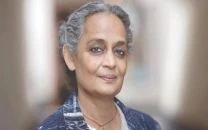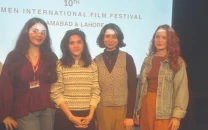DW Baig: Tunes from the Pamir mountains
Hailing from Hunza, DW Baig is on a mission to revive the Wakhi language through his music.

DW Baig: Tunes from the Pamir mountains
Research suggests that there are approximately more than 69 languages spoken in Pakistan. Many of these languages are indigenous and are fast becoming extinct as people now tend to mix Urdu and sometimes even English with their local language. And since ‘music is the universal language of all mankind’, the best way of garnering interest towards a certain language is through melody. That’s exactly what DW Baig set out to do when he started singing in the Wakhi language.
Baig, born in Gojal Hunza, found his calling in music, at a very young age. Inspired by his father, who used to play the sitar and rubab at home, Baig did not take very long to master these instruments and right after completing his studies, he and his cousin Kashif formed the band Zil. Their first Urdu single “Woh Yaadein” gained considerable recognition on the radio and on social networking websites like YouTube. Although, Kashif later left the band, Baig changed the name of his band to Sada-i-Pamir or Pamir’s Voice and decided to carry on. This time he hoped to sing only in his native Wakhi language, which is included in the United Nations Red Book of Endangered Languages as one of the oldest Indo-European language in the branch of Eastern-Iranian language family.
Keeping it alive
Although there are various folk songs in Wakhi, no one had ever professionally composed and recorded songs in the dying language. So, for Baig’s first album Noyofth, which means precious, he made sure that the songs were carefully penned down in Wakhi without diluting the language by fusing it with other languages; “I fused the local language with southern beats yet somehow managed to keep the tune and feel of the songs very northern, maybe that’s why my songs became instantly famous in Hunza as the locals there finally got something that they could listen and relate to,” states Baig. Some of his more famous songs such as “Khuzg Nan” (a tribute to mothers) and “Lurilai Lurilai Zu Dur Ya” (a lullaby for children) have become household names in the valleys. Apart from bringing about a revolution in the music of the valleys, Baig also introduced the first-ever female singer from the Wakhi belt, who has sung some of the songs of the album.
Meanwhile, in his recently-released second album, Gulipokiza, Baig sings about the majestic beauty of the mountains and valleys of the Pamir region as well as some romantic ballads. He collaborates with Afzal Karim, a local from the Gojal valley, who is now living in Canada. They decided to introduce classical phrases and words that have been long forgotten by the locals themselves; “I want to recreate awareness and the magic of the language,” says Baig. “Wuzam Ba Khoyeem”, a sad, romantic number from the album, has became an instant hit among youngsters of the Gojal area.
A hint of the Persian dialect, with soft instrumental beats, reflects the patience and resilience with which Baig has composed his album. Although, choosing to sing in a dying language might not be the savviest commercial move Baig’s sense of contentment and pride is visible. “It’s my love for my birth land that drives me to create songs in Wakhi and I will continue with my mission regardless of whether my songs become popular or not,” he firmly concludes.
Published in The Express Tribune, April 8th, 2012.



















COMMENTS
Comments are moderated and generally will be posted if they are on-topic and not abusive.
For more information, please see our Comments FAQ